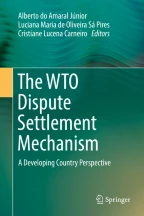
In parallel to WTO dispute settlement, a number of dispute settlement mechanisms have evolved as part of preferential trade agreements—sometimes also called ‘free’ or ‘regional’ trade agreements. These mechanisms are destined to settle disputes arising out of these particular trade agreements. Settling disputes within a preferential trade agreement may look promising, as it can build on a more close relationship between parties. However, in reality, there has been quite some overlap between WTO dispute settlement and settlement within these agreements. A number of pertinent cases are discussed alongside with a stocktaking of the academic discussion, which mainly addressed these incidents of a troublesome proceeding in parallel from the point of view of established doctrines of procedural law. As is explained here, these conflicting adjudications have to be seen from the point of view of an overlap in substantial law. Such overlap results from the fact that preferential trade agreements contain additional obligations and rules, while WTO rules are still applicable between the parties. Quite often, rules under the agreements in substance may overlap with WTO rules. As is shown, WTO dispute settlement can hardly be foreclosed to the advantage of dispute settlement in preferential agreements, where an overlap exists in substantial perspective. Also, WTO dispute settlement has a role to play in case that third parties have reason to complain about their WTO rights being nullified or impaired as a consequence of the conclusion or implementation of a preferential trade agreement.
This is a preview of subscription content, log in via an institution to check access.
eBook EUR 149.79 Price includes VAT (France)
Hardcover Book EUR 189.89 Price includes VAT (France)
Tax calculation will be finalised at checkout
Purchases are for personal use only
By 1 February 2016, WTO has received notification from 454 PTAs, of which 267 has been in force. See also: https://www.wto.org/english/tratop_e/region_e/region_e.htm. Accessed 20 April 2017. For recent instances of the growing literature on these trade agreements, Bartels and Ortino (2006), Bagwell and Mavroidis (2011) and Lester et al. (2016).
This article employs the term ‘PTAs’, when ‘RTAs’ applied merely for those agreements between geographically proximate trade partners and the term ‘FTAs’ excludes the customs unions. Further references to these terminologies, e.g. World Bank (2005) and World Trade Report (2011).
For instance, EU PTAs with Mediterranean countries: http://ec.europa.eu/trade/policy/countries-and-regions/agreements/#_mediterranean. Accessed 20 April 2017; also, Stabilization and Association Agreements between EU and Albania, EU and The former Yugoslav Republic of Macedonia, EU and Montenegro: http://ec.europa.eu/trade/policy/countries-and-regions/agreements/#_europe. Accessed 20 April 2017.
For example: Article 75 of Euro – Mediterranean Agreement Establishing an Association between the European Communities and their Member States, of the one Part, and the State of Israel, of the other part; Article 82 of Euro – Mediterranean Agreement Establishing an Association between the European Communities and their Member States, of the one Part, and the Arab Republic of Egypt, of the Other Part; Article 86 of Euro – Mediterranean Agreement Establishing an Association between the European Communities and their Member States, of the one part, and the Kingdom of Morocco, of the other part.
For instance, Article 22.9 of Free Trade Agreement between The United States of America and The Republic of Korea; Article 15.7 of Free Trade Agreement between The Government of Australia and The Government of People’s Republic of China; Article N-08, Article N-09, Article N-10, Article N-11 of Free Trade Agreement between The Government of Canada and the Government of the Republic of Chile.
Article 22.13 of Free Trade Agreement between The United States of America and The Republic of Korea; Article N-18 of Free Trade Agreement between The Government of Canada and the Government of the Republic of Chile.
Puig and Lee (2015).For example: The establishment of ‘Contact Point’ in numerous PTAs, e.g. Article 15 of Agreement between Japan and the Republic of Peru for an Economic Partnership; likewise, institutions like secretariat and coordinator under PTAs e.g. Free Trade Agreement Between Canada and The Republic of Honduras, i.e. Article 21.2, Article 21.3.
For instance, Free trade Agreement between the European Union and its Member States, of the one part, and the Republic of Korea, of the other part contains a number of mediation provisions, especially a Mediation Mechanism for Non-Tariff Measures has been established in Annex 14-A; moreover, Article 17.5 of The Singapore-Costa Rica Free Trade Agreement states ‘mediation are procedures undertaken voluntarily if the Parties so agree’, which mirrors Article 28.6 of TPP; CETA is inserted with an annex of Mediation Procedure, etc.
WTO Panel Report, United States – Preliminary Determinations with respect to Certain Softwood Lumber from Canada, WT/DS236/R, adopted 27 September 2002; WTO Appellate Body Report, United States – Final Countervailing Duty Determination with respect to Certain Softwood Lumber from Canada, WT/DS257/AB/R, adopted 19 January 2004; WTO Appellate Body Report, United States—Final Dumping Determination on Softwood Lumber from Canada, WT/DS264/AB/RW, adopted 15 August 2006; WTO Appellate Body Report, United States – Investigation of the International Trade Commission in Softwood Lumber from Canada, WT/DS277/AB/RW, adopted 13 April 2006; and Notification of Mutually Agreed Solution—United States—Final Countervailing Duty Determination with Respect to Certain Softwood Lumber from Canada, WT/DS257/26, G/L/539/Add.1, G/SCM/D45/ notified 16 November 2006.
Notification of Mutually Agreed Solution—United States—Final Countervailing Duty Determination with Respect to Certain Softwood Lumber from Canada, WT/DS257/26, G/L/539/Add.1, G/SCM/D45/ notified 16 November 2006.
Chapter 19 of NAFTA, see also: http://www.sice.oas.org/trade/nafta/chap-191.asp. Accessed 20 April 2017.
WTO Panel Report, Argentina – Poultry Anti-dumping Duties, WT/DS241/R, adopted 22 April 2003.WTO Panel Report, Mexico – Soft Drinks, WT/DS308/R, adopted 7 October 2005; and WTO Appellate Report, Mexico – Soft Drinks, WT/DS308/AB/R, adopted 6 March 2006.
Kwak and Marceau (2003), Henckels (2008) and Yang (2014). Henckels (2008) and Mitchell and Heaton (2010).WTO Panel Report, Argentina – Poultry Anti-dumping Duties, WT/DS241/R, adopted 22 April 2003, para. 7.18, 7.19.